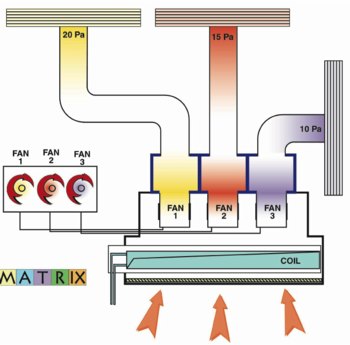Multi-spigot fan-coil units feature fans with individual speed control to eliminate volume-control dampers

Each fan in Matrix fan-coil units from Ability Projects can have its speed individually controlled, eliminating the need for volume-control dampers in each ductwork branch.
Matrix fan-coil units from Ability Projects have electronically commutated motors and are available as 2- and 4-pipe horizontal-chassis units offering up to 8 kW of cooling and 5 kW of heating. The key feature of the Matrix range is that the speed of each fan in a unit is controlled individually. Each fan serves a single subdivided section of the discharge plenum and, hence, a single discharge grille. An installer can thus commission and balance the air volume in each duct using fan speed alone, instead of using volume-control dampers. Speed control is infinitely variable, not stepped. Since there is no need for volume-control dampers, capital and installation costs are reduced. Also, since Matrix multiple speed controllers are located together on the electrical housing of the fan-coil unit, there is no need to remove several ceiling tiles, as would be required with volume-control dampers. Eliminating the need for volume-control dampers prevents associated fan-noise problems and reduces the power consumption of the fans. Matrix fan-coil units are compatible with building-management systems and stand-alone controllers. Ability will shortly introduce a BACnet BMS terminal controller that will enable the speed of each fan to be fully adjustable via the BMS. There will then be no need to physically adjust fan speed on the unit itself. Ability’s web site includes an animated and interactive model of the Matrix systems, illustrating its operating principles and benefits.
Related links:


